Conduct a free Vermont divorce records search to discover more about a person’s marital history and the details surrounding any dissolution of a marriage. Divorce records can be used for genealogy and are also needed for various business or legal reasons.
Record seekers can use online databases and other resources to obtain divorce information.
Citizens have access to this information thanks to the Vermont Public Records Law, which requires divorce information and other records to be available to the public.
Below, you’ll find everything you need to know about accessing divorce records for free in Vermont. Use the tools and resources provided below to search and access them.
This resource was written by Attorney Robert Bailey Jr, who holds a Juris Doctorate from Widener University School of Law.
Can Anyone Look Up Divorce Records in Vermont?
Vermont divorce records are publicly available and can be searched by any citizen. Vermont passed 8 V.S.A. § 5002, which requires divorce records to be maintained in two different ways.
First, the Vermont State Registrar must provide an annual report that summarizes each year’s divorces. Secondly, this statute requires the Vermont state registrar to provide the actual decrees to the State Archivist for use by the public.
Both the State Registrar and Archivist are authorized to provide certified copies of a divorce certificate when properly requested.
It’s important to understand that there is a distinction between divorce records and the decree. Divorce records provide data about the divorce, such as the party’s names when they were divorced and related information. A Decree is the actual legal document that ends a marriage.
Divorce records are free and can be accessed online. However, a request for the decree will require payment and involves following the specific steps of the agency that is the custodian of the record. In addition, only certain eligible individuals can request a certified copy of a decree. Those people include the following:
- Party to the divorce
- Parent
- Sibling
- Child (of legal age)
- Grandchild (of legal age)
- Grandparent
- Legal guardian
- Executor or administrator of an estate
- Legal representative for anyone listed above
- Anyone with a court order providing authorization
In addition to divorce records, you can get various information on divorce rates and other related data in Vermont. Each year, the Vermont Department of Health provides its annual vital statistics report.1
This report provides the total number of divorces (and dissolutions) and the rate per number of residents (currently 2.3 per 1,000 people). You can see this information for every year dating back to 2000 and then in various year increments going all the way back to 1857.
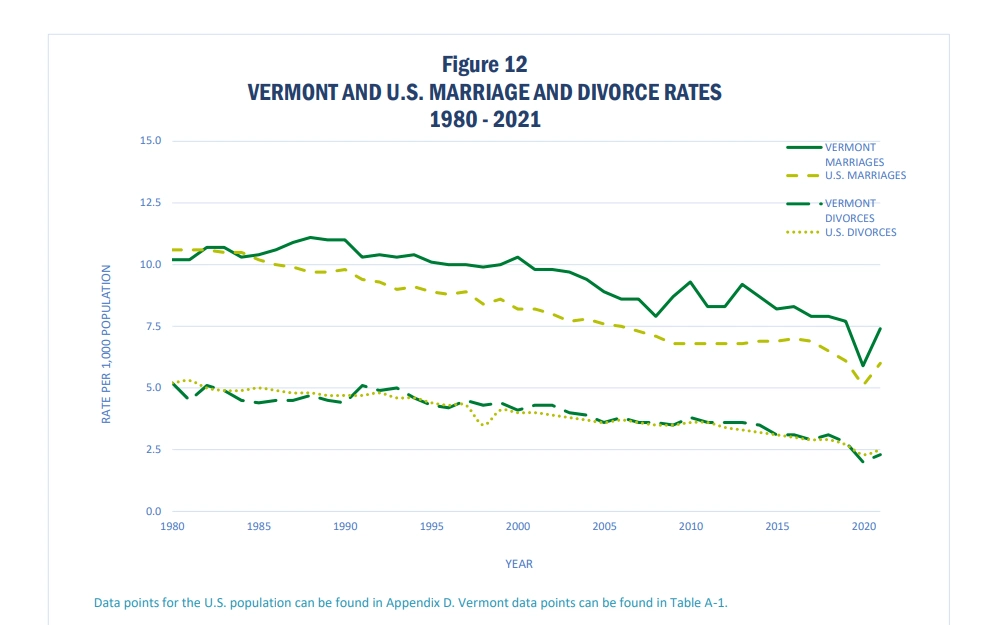
The Vermont Department of Health provides the following divorce index tables:
- The month of divorce by county that issued the divorce decree
- The age of both applicants at the time of divorce
- Number of years married at the time of divorce by the county where the divorce was issued
How To Find Vermont Divorce Records at No Cost
If a person wants to find divorce records in Vermont for free, they can do so by performing a search with the Vermont Judicial Case Search Tool.3
To access divorce records, select “Smart Search.” Here, you can search by a person’s name or case number. If you only have the person’s name, you will want to narrow your search to court records involving a dissolution or divorce.
To search divorce cases, select Advanced Filtering Options. Scroll all the way down to “Case Search Criteria” and select the Family Division for Case Type. In addition, you can narrow your search in other ways depending on the type of information you have available. A record seeker can select a particular court location or the current status of the cases.
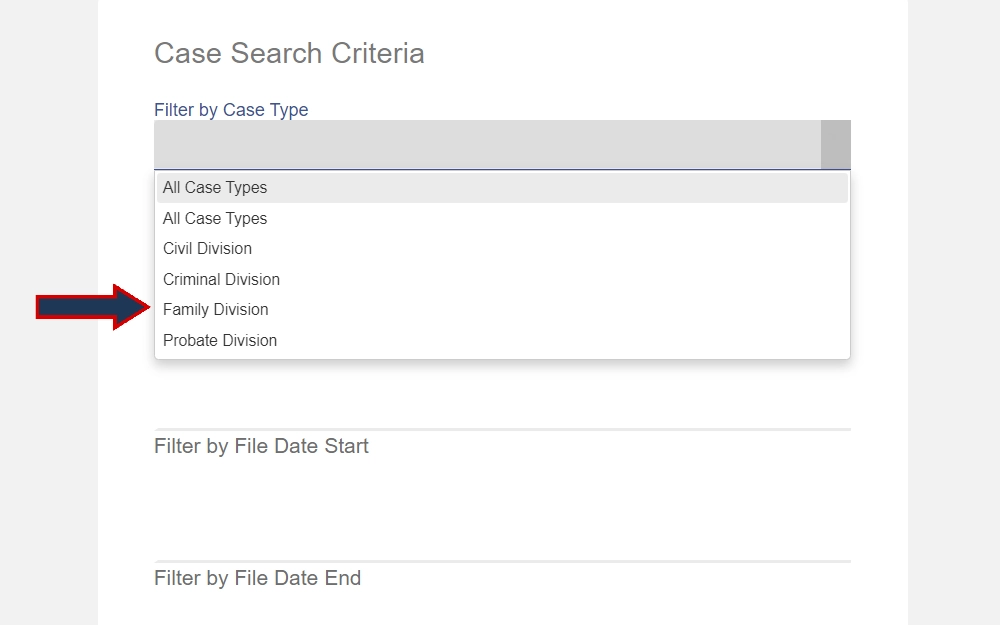
Unless you want to search for an active case, to access finalized divorce papers, you will want to select “closed” for the case status. Lastly, an individual can narrow down their search results for divorce records by setting a filing date range.
Once an individual completes their search, they will see a list of search results. From there, a person can click on the record they want to access. Once you access a record, you can get a variety of information. At the top of the page, you can get basic information, such as the case number, filing date and where the divorce case was held.
The remainder of the case record is divided into the following sections:
Case Information: Here, you can view the status of the case, including when and how it was resolved.
Assignment Information: This includes the date the case was assigned and other information that was in the case summary.
Party Information: Here, you can get the names of the parties to the divorce and their attorneys.
Case Events: This final section will provide a chronological listing of every event from when the divorce petition is filed to when the decree is issued.
If you want to request a certified copy of a decree, you can do so through the Vermont Department of Health.5 One option is to make an online Vital Records Request with the Vermont Department of Health. The cost for a certified divorce record is $12.00, and the record will ship in approximately five to seven business days.
A record can be expedited for an additional $14.50.
To use this online tool, you start by providing your contact information, as well as the type of identification you will provide, to show you are eligible to receive a certified copy. The next page will require you to provide information on both parties to the divorce, such as their name and age at the time the decree was issued.
In addition, you will be asked to provide the date of the divorce, as well as the town and county where the divorce occurred.
This page is where you will also provide your reason for the request (e.g., genealogy search, insurance, social security) and your eligible relationship for requesting a certificate.
For divorce records from 2014 to the present (as well as all civil union dissolutions), you can also submit an Application for Certified Copy of Divorce Record by mail. Once you complete this application, you can mail it along with your fee and a self-addressed stamped envelope to the address below:
Vermont Department of Health
Vital Records Office
P.O. Box 70
Burlington, Vermont 05402
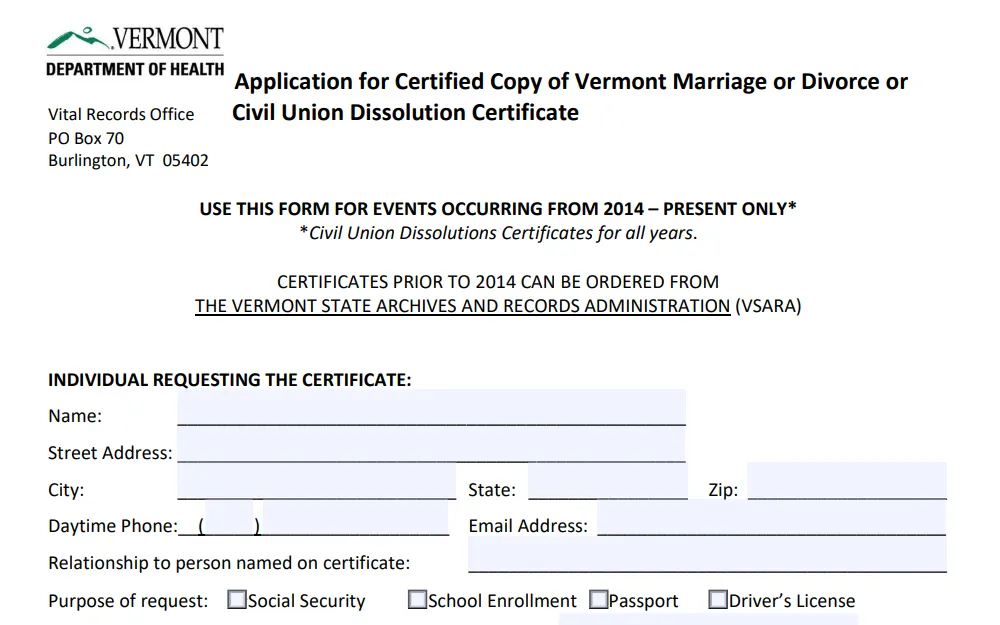
For a non-certified copy of a divorce (which can be requested by anyone), you can submit a request either by email at [email protected] or to the address below:
Vermont Department of Health
Vital Records
108 Cherry St., P.O. Box 70
Burlington, Vermont 05402
Your request must indicate you are requesting a non-certified copy of a divorce and provide the parties’ names and the date the decree was issued. A non-certified copy of a divorce will be provided at no cost.
For additional questions, you can call the Vermont Department of Health at 800-439-5008. They are open Monday through Friday, from 7:45 AM to 4:30 PM.
A divorce record can also be requested through the Vermont State Archives & Records Administration for divorces from 2013 and earlier.7
To do so, you can complete a Certified Copy of Divorce Record Request. Each certified copy costs $10.00 (made payable to the Vermont Secretary of State), and requests can only be made by mail. Completed applications must be sent to the below address:
Vermont State Archives & Records Administration
Office of the Secretary of State
1078 U.S. Route 2
Montpelier, Vermont 05633
A last option is to request a copy of a decree with the court that issued it. To make a request, complete the Request for Access to Court Record Form and submit it to the court where the case was handled. If you do not know the court, you can use the Vermont Judicial Case Search Tool to get this information.
Finding Records of Divorce via County Resources in VT
If you are looking for the broadest and most encompassing solution, then you will want to search or request records at the state level as previously discussed. However, a searcher may want an alternative to the state-level options.
An individual may want to perform a free public divorce records search at the local level. This may be needed if you, for whatever reason, were unable to find what you are looking for at the state level. You may also want to conduct a local search because it’s more convenient, or you have easier access to a person you can ask questions.
Whatever your reason, below you’ll find guidance on how a record seeker can access Vermont divorce records in a few of the larger counties in Vermont.
Chittenden is the largest county in Vermont by population. If you are looking for a divorce record, you can start by contacting the Vermont Superior Court’s Chittenden Family Division. To ask them what their process is for searching and accessing divorce records in their custody, you can contact them by email at [email protected] or by phone at 802-651-1709.
You can also go to the address below:
Vermont Superior Court
Chittenden Family Division
32 Cherry St., Ste. 200
Burlington, Vermont 05401
They are open Monday through Friday, from 8:00 AM to 4:30 PM.
For divorce records in Rutland County, you can contact their local court family division. The Vermont Superior Court’s Rutland Family Division can be contacted by email at [email protected] or by phone at 802-786-5856.8 They are open from 8:00 AM to 4:30 PM, from Monday through Friday.
If you want, you can also talk to someone about requesting a divorce record by going to the address below:
Vermont Superior Court
Rutland Family Division
9 Merchants Row
Rutland, Vermont 05701
For divorce records in Vermont’s third most populated county, Washington, you can contact their courthouse’s own independent family division. The Washington Family Division is located at the address below:
Vermont Superior Court
Washington Family Division
255 N. Main Street, Ste. 1
Barre, Vermont 05641
You can also call them at 802-479-4205 or email them at [email protected]. They are available Monday through Friday, from 8:00 AM to 4:30 PM. In addition to looking up records at the county level, you can also access archived records for genealogy purposes.
Searching Divorce Archives in Vermont for Genealogy & Lineage Research (Free)
If your goal is to perform a genealogy or lineage search and you need access to archived public divorce records, then you should begin your search with the Vermont State Archives & Records Administration.
In 1896, it was made a state requirement to record statistics for divorces granted along with the reason. However, starting in 1898, the actual divorce returns were required to be submitted with the State Vital Registry.
While a record seeker can simply complete and mail an application for a divorce record if they have the information, that is not always the case. Sometimes, you need to search for these records when in the process of performing lineage research.
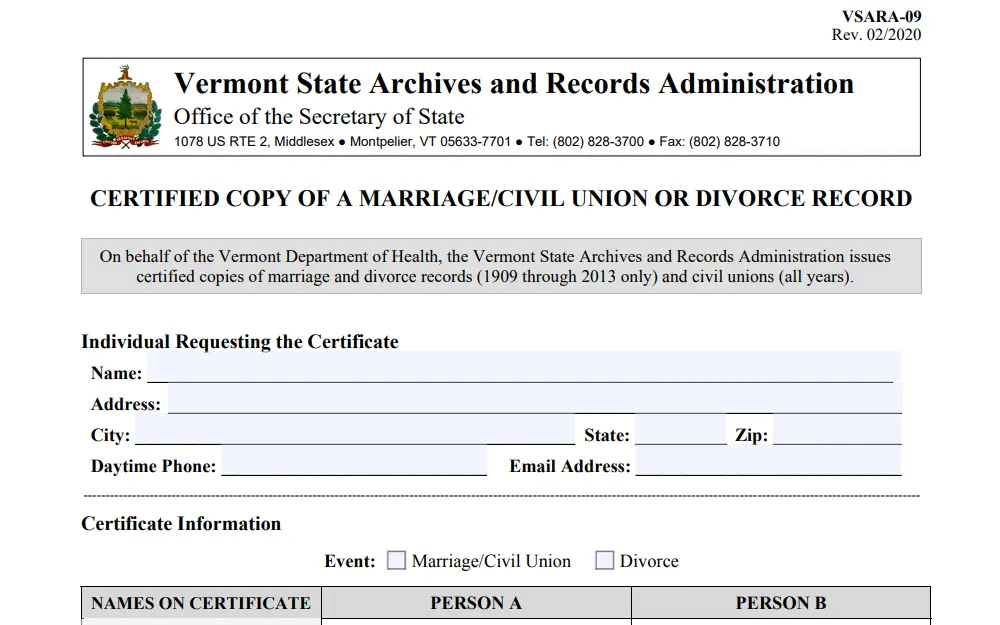
If an individual wants to search for divorce records, they can go to the Vermont State Archives & Records Administration public reference room.10 This room is provided to citizens who want to inspect and copy Vermont’s archived public records, including divorces. The public reference room is located at the address below:
Vermont State Archives & Records Administration
1078 Rte. 2, Middlesex
Montpelier, Vermont 05633
The public reference room is open Monday through Friday, from 9:00 AM to 4:00 PM. If you want to look up records in person, it is recommended that you call to make an appointment first. To make an appointment or for any questions related to searching their archived divorce records, you can contact them by phone at 802-828-3208 or by email at [email protected].
The Vermont State Archives and Records Administration also has an online archives repository in its early stages of development, VT Re•tain.
While this is your most comprehensive option for searching divorce records, there are other options. Finding different ways to access this information may take searching through other resources with local public libraries, old newspapers and similar types of resources. You can also try using the resources provided by the Vermont Historical Society.
They provide various genealogy indexes of vital records that may assist with your search for older Vermont divorce records.
How To Determine if Someone Had a Dissolution of Marriage in Vermont
If a subject is seeking to determine whether someone has had a dissolution of marriage in Vermont, the primary way to find out is by using the Vermont Judicial Case Search Tool. This search tool can be used to search family case records, including divorces and dissolutions
From July 1, 2000, to September 1, 2009, civil unions allowed same-sex couples to receive the benefits of marriage. Civil unions were no longer necessary after this date because same-sex marriage was codified into law. However, for those who entered a civil union during this time, there is still the option of requesting a Dissolution of a Civil Union.11
In addition, parties can seek an annulment, which is basically the court declaring that you were never legally married.
For any of these records, the custodian will be the court that ordered the divorce, dissolution etc. If you cannot find the information you are looking for with the Vermont Judicial Case Search Tool, then you can try going in person to the court or clerk’s office where you believe a case may be located.
How To Navigate the Vermont Divorce Process: Filing & Addressing Petitions
If you find yourself looking to file for divorce in Vermont, you may feel overwhelmed or confused by the process. This may be an even more upsetting situation if you were not expecting a divorce and your spouse filed one to your surprise.
In Vermont, either party can initiate a divorce. Vermont is a no-fault divorce state, which means that there does not need to be a determination of blame on either party to proceed with a divorce. The primary requirement is that you and your spouse have lived apart for six months or longer, and it’s not probable that you will reconcile your marriage.
However, the six-month requirement does not have to be met until the decree is issued.
There is also a two-fold residency requirement. First, one party to the divorce must be a Vermont resident for at least six months. Second, one party must live in Vermont continuously for a year before the final divorce hearing.
Even after everything is agreed to and there is a final hearing, there is a three-month waiting period at the end before the divorce is officially final.
The filing fee for a divorce can vary depending on how the complaint for divorce is submitted. The standard filing fee in Vermont is $295.00. However, the fee is only $90.00 if the parties have included a stipulation agreeing to all aspects of the divorce (e.g., alimony, child support, property division etc.).
There may also be costs for serving the divorce on your spouse and required parenting classes if you have children. In certain situations, you can also submit an Application to Waive Filing Fees & Service Costs.12
To file a divorce, a person must prepare a complaint. This information can be submitted by filing a divorce complaint without children or with children. The complaint must contain basic information about you, your spouse and children (if applicable).
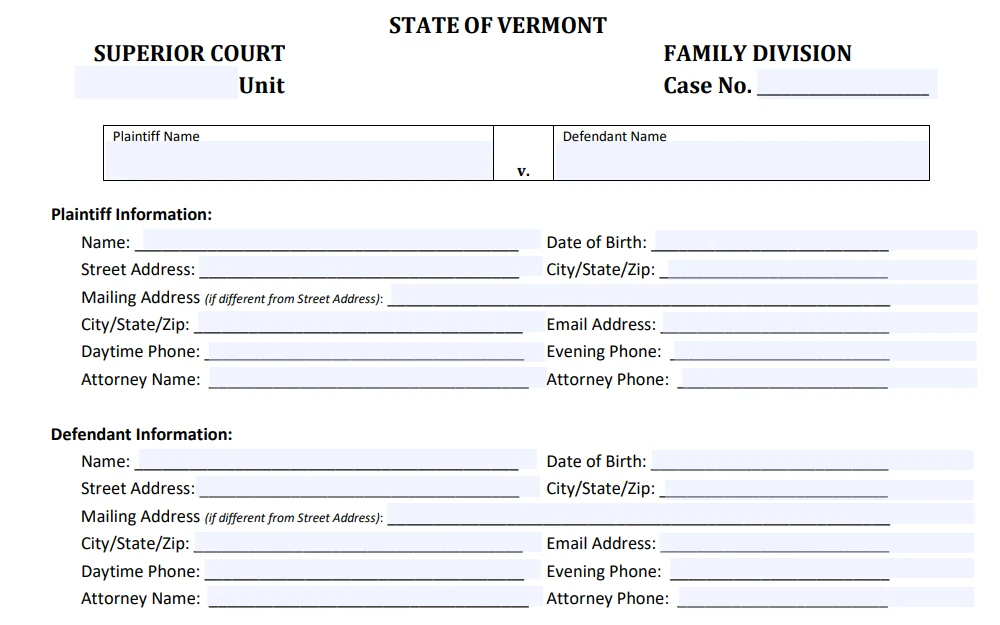
You will also need to provide the date and place of your marriage. Finally, you will use the complaint to tell the court what you are looking to obtain from the divorce (e.g., name change, custody etc.).
Once a complaint is prepared, you have to both file the complaint with the family division of the Vermont Superior Court in your county and deliver a copy (i.e., serve) to your spouse.
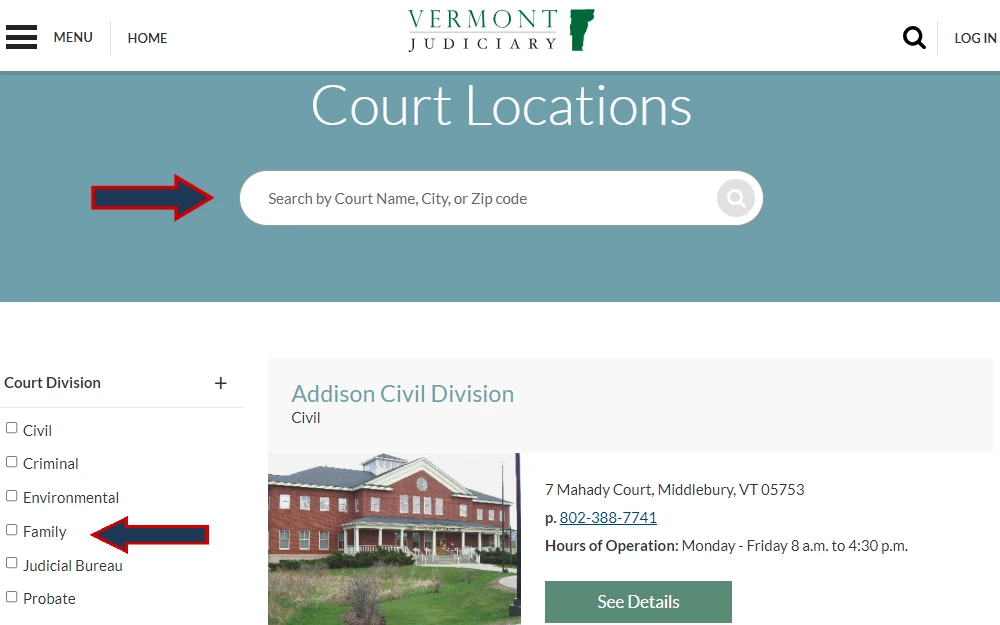
If you are on the other side of a divorce case, it is important to know how to respond to a complaint. The first step is to acknowledge you received the complaint by signing an Acceptance of Service or Acknowledgement. When you sign this form, all it means is that you received the complaint.
This acknowledgement is not in agreement with the content of the Complaint.
In Vermont, once you receive a Complaint, you will have twenty-one days to file an Answer. Depending on your familial situation, you will submit either an answer to complaint without children or with children. Your Answer will indicate what statements in the Complaint you agree with and an opportunity to dispute anything you disagree with.
A defendant (the person who receives the divorce complaint) can also file a counterclaim, which is a lawsuit filed against the person who filed the divorce.
This may be needed if you want to include matters not mentioned in the complaint or if you disagree with any of the requests made in the divorce complaint. Similar to the divorce complaint, an Answer must both be filed with the court and served on the other party.
Note: There are other options in addition to divorce. Couples in Vermont have the option to have a legal separation (Mensa et thoro) or dissolution of a civil union. There is no such thing as a common law divorce.
For additional information, you can view detailed information about the divorce process provided by the Vermont Judiciary.15
Beyond the legal process, there may be other complexities. For instance, if you and your spouse have a significant number of assets, you may have to get a divorce appraisal to determine the fair market value of these items.
Remember, while you can use this advice to guide you, it is incredibly helpful to hire a competent lawyer in Vermont who specializes in family law. As every divorce case is unique, they can assist you with any complexities or nuances involved in your case.
As a citizen, you now have a better understanding of the Vermont divorce process.
As a record seeker, you are now equipped with the tools and resources necessary to search a variety of Vermont divorce records; for other public information (marriages, births, deaths, property, background checks, and more), the instructions for accessing all free VT public records has all you need for a seamless lookup.
References
1Vermont Department of Health. (n.d.). Annual Vital Statistics Reports. Retrieved November 9, 2023, from <https://www.healthvermont.gov/stats/vital-records-population-data/annual-vital-statistics-reports>
2Vermont Department of Health. (2023, September). Vermont Vital Statistics Annual Report 2021. Retrieved November 9, 2023, from <https://www.healthvermont.gov/sites/default/files/document/hsi-vital-records-2021-annual-report.pdf>
3Vermont Judiciary. (n.d.). Public Portal. Retrieved November 9, 2023, from <https://portal.vtcourts.gov/Portal>
4Vermont Judiciary. (n.d.). Smart Search. Vermont Judiciary Public Portal. Retrieved November 9, 2023, from <https://portal.vtcourts.gov/Portal/Home/Dashboard/29#>
5Vermont Department of Health. (n.d.). Order Vital Records. Retrieved November 9, 2023, from <https://www.healthvermont.gov/stats/vital-records-population-data/order-vital-records>
6Vermont Department of Health – Vital Records Office. (n.d.). Application for Certified Copy of Vermont Marriage or Divorce or Vital Records Office Civil Union Dissolution Certificate. Retrieved November 9, 2023, from <https://www.healthvermont.gov/sites/default/files/documents/pdf/HS_VR_App_Certificate-Marriage-Divorce-Dissolution.pdf>
7Vermont Secretary of State | Vermont State Archives & Records Administration. (n.d.). Certified Vital Records. Retrieved November 9, 2023, from <https://sos.vermont.gov/vsara/request/certified-vital-records/>
8Vermont Judiciary. (n.d.). Rutland Family Division. Retrieved November 9, 2023, from <https://www.vermontjudiciary.org/court-locations/rutland-family-division>
9Vermont State Archives and Records Administration. (2020, February). Certified Copy of Marriage or Civil Union or Divorce Record Request Form. Retrieved November 9, 2023, from <https://sos.vermont.gov/media/4glf4zff/vsara-09_marriage_civil-unions.pdf>
10Vermont State Archives & Records Administration. (n.d.). Research Vermont Archival Records. Vermont State Archives & Records Administration. Retrieved November 9, 2023, from <https://sos.vermont.gov/media/4glf4zff/vsara-09_marriage_civil-unions.pdf>
11Vermont Judiciary. (n.d.). Civil Union and Dissolution. Retrieved November 9, 2023, from <https://www.vermontjudiciary.org/family/divorce/civil-union-and-dissolution>
12Vermont Judiciary. (n.d.). Application to Waive Filing Fees and Service Costs. Retrieved November 9, 2023, from <https://www.vermontjudiciary.org/self-help/application-waive-filing-fees-and-service-costs>
13Vermont Judiciary. (2022, February). Divorce Complaint w/o Children Form. Retrieved November 9, 2023, from <https://www.vermontjudiciary.org/sites/default/files/documents/400-00836NoKids_1.pdf>
14Vermont Judiciary. (n.d.). Court Locations. Retrieved November 9, 2023, from <https://www.vermontjudiciary.org/court-locations>
15Vermont Judiciary. (n.d.). Divorce Process. Retrieved November 9, 2023, from <https://www.vermontjudiciary.org/family/divorce/divorce-process>
